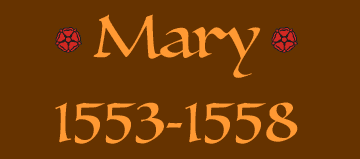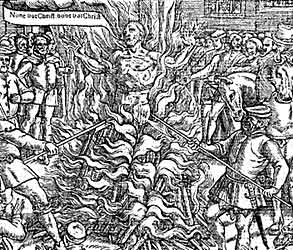|
|
|
|
|
|
|
|
|
|
|
|
|
|
|
|
|
|
|
|
|
|
|
|
|
|
|
|
 |
|
|
|
|
|
|
|
|
|
|
|
|
|
|
|
|
|
|
|
|
 |
|
|
|
|
|
|
|
|
|
|
|
|
Queen
Mary, the first female monarch in English history, was brought up as a devout
Catholic by her Spanish mother Catharine of
Aragon. Upon her succession to the throne, Mary single mindedly set out
to restore the "true faith" to England and repair the damage of the Reformation.
She attempted to restore the Catholic Church in England politically, if not
economically, but the Pope would not cooperate with her unless she promised
to return the Church's lands, which she could not do. |
|
|
|
|
|
|
|
Portrait
of Queen Mary when still in her twenties |
|
|
|
|
|
|
|
At
Edward VI's death, England still was not ardently
Protestant or Catholic. Her first parliament abolished Edward VI's religious
laws. Mary attempted to kill off the most influential of her Protestant opponents
within England, such as Thomas Cranmer and
Hugh Latimer. Her vigorous attempt to eradicate Protestantism resulted in the
"Marian Prosecutions" in which some 300 Protestants were burned during the four
years of her reign, earning the Queen the title "Bloody Mary." While
she cowed the Protestants, at the same time Mary's actions heightened their
sense of outrage against Catholicism. Mary wanted to restore the physical objects
of the Catholic faith that were necessary for the liturgy. To Catholics, shrines,
images and relics were not merely a collection of adjuncts to the Latin
mass, but important manifestations of religious doctrine and practice. The need
for material aids in worship were predicated on the assumption that images were
essential to understanding the divine mysteries. Despoiled churches were a symbol
of a Protestant victory, which is why the Queen strongly supported a return
to images because they were symbolic of the restoration of the Catholicism and
papal supremacy in England.Mary wanted to rebuild shrines, such as the one to
Edward the Confessor in order to instill |
|
|
|
|
|
|
|
|
|
|
|
|
|
|
 |
|
|
|
|
|
Detail
of Protestant martyr burning at the stake during Queen Mary's reign. |
|
|
"some measure of its original comeliness." Furtive iconoclasm continued
and the Queen discovered that it was harder to restore that to destroy, especially
when her subjects were wary and apathetic. Despite her efforts only a makeshift
appearance took hold as the country was reluctant to spend the money to refurbish
all that had been lost on what they saw as a interim situation. With the Protestant
Princess Elizabeth next in line for the throne,
England knew that any attempts at a return to Catholicism were only temporary.
|
|
|
|
|
|
|
|
|
|
|
|
|
|
 |
|
|
|
|
|
|
|
|
|
|
|
|
|
|
 |
|
|
|
|
|
|
|
|
|
|
|
|
|
|
|
|
|
 |
|
|
|
|
|
|
|
|
|
|
 |
 |
 |
 |
 |
 |
 |
 |
 |
 |
 |
 |
 |
 |
 |
 |
 |
 |
 |
 |
 |
 |
 |



